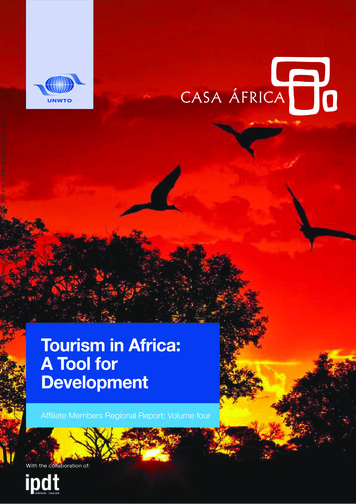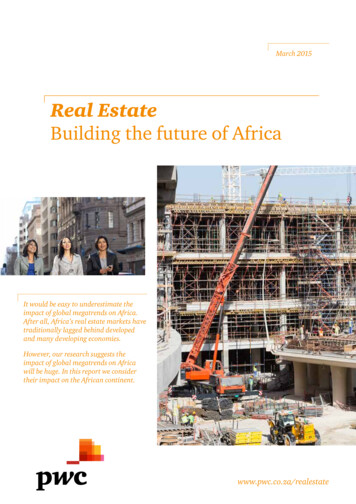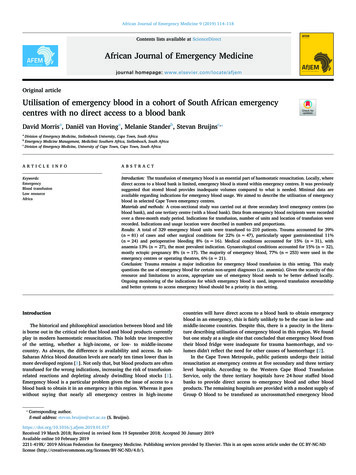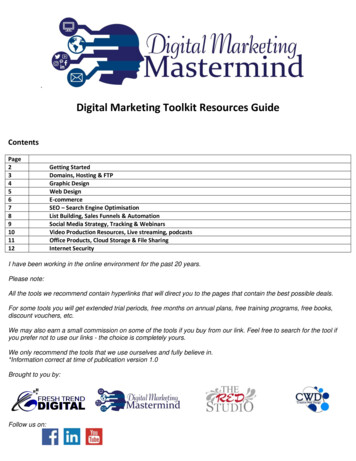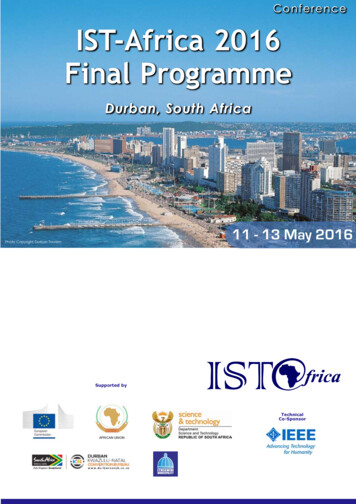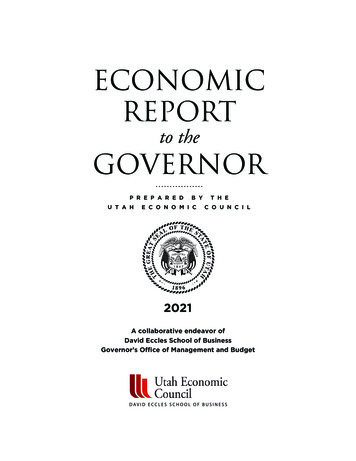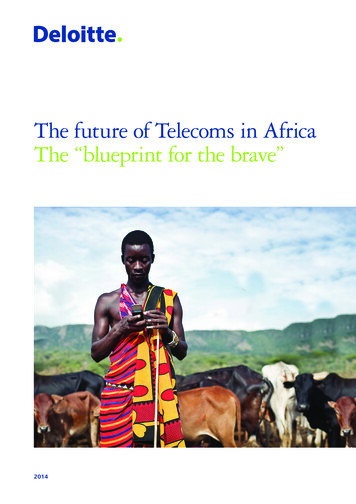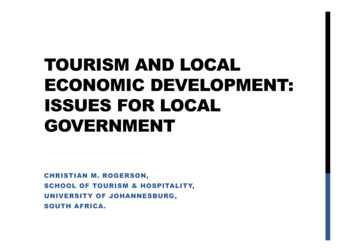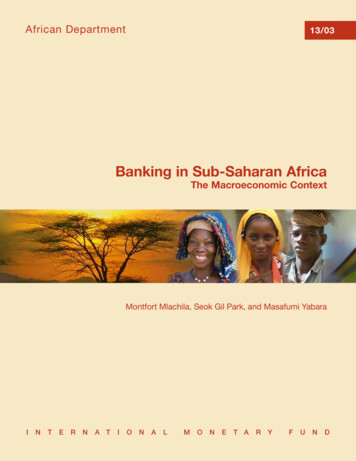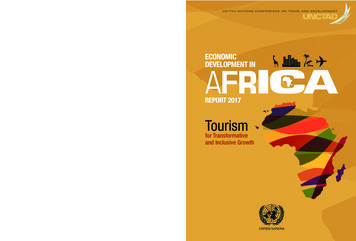
Transcription
UNCTADunctad.org/Africa/series“On the occasion of the International Year of Sustainable Tourism forDevelopment, this insightful and timely report highlights the importanceof the tourism sector in Africa, and proposes clear policies on howto better harness such potential and build a better and more inclusivefuture for Africa and its people.”Taleb Rifai, Secretary-General, World Tourism OrganizationECONOMICDEVELOPMENT INECONOMIC DEVELOPMENT IN AFRICA REPORT 2017Tourism – in terms of its contribution to gross domestic product, employmentand trade – is an important sector in many African economies, and its growth isincreasingly driven by tourists originating from the continent itself. However, mostAfrican countries still face significant challenges and constraints in exploiting thepotential of tourism services in trade and economic development. The EconomicDevelopment in Africa Report 2017: Tourism for Transformative and InclusiveGrowth examines the role that tourism can play in Africa’s development process.It identifies the main barriers to unlocking the potential of tourism in Africato help structurally transform the continent’s economy and provides policyrecommendations on how to overcome them. In sum, tourism can be an enginefor inclusive growth and a complement to development strategies aimed atfostering economic diversification and structural transformation within anappropriate policy context.“This important report on tourism, inclusive growth and regionalintegration is essential reading for policymakers, academics and tourismpractitioners concerned with job creation and the future of economicand social development in Africa.”Christian M. Rogerson, Professor, School of Tourism and Hospitality,University of Johannesburg, South AfricaUNCTAD/ALDC/AFRICA/2017United Nations publicationSales No. E.17.II.D.2ISSN 1990-5114ISBN 978-92-1-112910-6UNITED NATIONSPrinted at United Nations, Geneva1700000 (E)–April 2017–3,921U N I T E D N AT I O N S C O N F E R E N C E O N T R A D E A N D D E V E L O P M E N TREPORT 2017Tourismfor Transformativeand Inclusive Growth
“For millions of Africans,tourism is a lifeline – its potentialfor driving transformative andinclusive growth must be harnessed.”Mukhisa KituyiSecretary-General, UNCTAD
U N I T E D N AT I O N S C O N F E R E N C E O N T R A D E A N D D E V E L O P M E N TEconomic Development in AfricaReport 2017Tourism for Transformative and Inclusive GrowthNew York and Geneva, 2017
Economic Development in Africa Report 2017NoteThe designations employed and the presentation of the material do not imply theexpression of any opinion on the part of the United Nations concerning the legal statusof any country, territory, city or area, or of authorities or concerning the delimitation ofits frontiers or boundaries.The designation employed and the presentation of material on any map in this work donot imply the expression of any opinion whatsoever on the part of the United Nationsconcerning the legal status of any country, territory, city or area or of its authorities, orconcerning the delimitation of its frontiers or boundaries.Any references to dollars ( ) are to United States dollars.Material in this publication may be freely quoted or reprinted, but acknowledgement isrequested, together with a copy of the publication containing the quotation or reprint tobe sent to the UNCTAD secretariat.Regional classifications used in this reportEastern AfricaBurundi, Comoros, Djibouti, Eritrea, Ethiopia, Kenya, Madagascar, Malawi, Mauritius,Mozambique, Rwanda, Seychelles, Somalia, South Sudan, Uganda, United Republic ofTanzania, Zambia, ZimbabweMiddle AfricaAngola, Cameroon, Central African Republic, Chad, Congo, Democratic Republic of theCongo, Equatorial Guinea, Gabon, Sao Tome and PrincipeNorthern AfricaAlgeria, Egypt, Libya, Morocco, Sudan, TunisiaSouthern AfricaBotswana, Lesotho, Namibia, South Africa, SwazilandWestern AfricaBenin, Burkina Faso, Cabo Verde, Côte d’Ivoire, Gambia, Ghana, Guinea,Guinea-Bissau, Liberia, Mali, Mauritania, Niger, Nigeria, Senegal, Sierra Leone, TogoUNCTAD/ALDC/AFRICA/2017United Nations PublicationSales No E.17.II.D.2ISBN 978-92-1-112910-6eISBN 978-92-1-060368-3ISSN 1990-5114iiCopyright United Nations, 2017All rights reserved
Tourism for transformative and inclusive growthAcknowledgementsThe Economic Development in Africa Report 2017: Tourism for Transformative andInclusive Growth was prepared by Junior Roy Davis (team leader), Jane Muthumbi,Claudia Roethlisberger and Olivia Shillabeer. The work was completed under the overallsupervision of Paul Akiwumi, Director, Division for Africa, Least Developed Countriesand Special Programmes.An ad hoc expert group meeting on tourism as a means of achieving transformative andinclusive growth was held in Geneva, Switzerland, on 19 and 20 January 2017 to conducta peer review of the report. The meeting brought together specialists in African tourismand economic development. The following people participated in the meeting andcontributed to the report: Dirk Bezemer, Professor, Faculty of Economics and Business,Global Economics and Management, University of Groningen; Dale Honeck, Counsellor,Trade in Services and Investment Division, World Trade Organization; Andrew Mold,Officer-in-Charge and Geoffrey Manyara, Economic Affairs Officer, Subregional Office,Eastern Africa, Economic Commission for Africa; Carmen Nibigira, Regional Coordinator,East Africa Tourism Platform; Christian Rogerson, Professor, School of Tourism andHospitality, Faculty of Management, University of Johannesburg; Ester Rubio, IntegratedTrade Intelligence Portal Coordinator, World Trade Organization; Zoritsa Urosevic,Representative of the World Tourism Organization (UNWTO) to the United Nations atGeneva; William Davis, Economic Affairs Officer, Economic Commission for Africa; andFaiçal Belaid, PhD student in international economics, Graduate Institute of Internationaland Development Studies, Geneva. Members of the Economic Development in AfricaReport team also attended the meeting.The following staff members took part in and/or made comments on the draft: DianaBarrowclough, Hassiba Benamara, Lisa Borgatti, Elissa Braunstein, Milasoa CherelRobson, Mussie Delelegn, Samuel Gayi, Martine Julsaint-Kidane, Nicole Moussa,Patrick Nwokedi Osakwe, Amelia Santos-Paulino, Carolina Quintana, Astrit Sulstarova,Antipas Touatam, Rolf Traeger, Giovanni Valensisi, Guillermo Valles, David Woodward,Frida Youssef, Anida Yupari and Simonetta Zarrilli.Agnès Collardeau-Angleys provided statistical assistance; Stefanie West providedsecretarial support; Sophie Combette designed the cover; Deniz Barki and LucyDélèze-Black edited the report; and Madasamyraja Rajalingam, in collaboration withNadège Hadjémian, was responsible for the layout, graphics and desktop publishing.iii
Tourism for transformative and inclusive growthTable of m for transformative and inclusive growth1CHAPTER 1The tourism sector in Africa: Stylized facts1.1 Definitions1.2 Key characteristics of the tourism sector in Africa1.3 Tourism in national development plans1.3.1 Mapping African tourism policy at the national level911123434CHAPTER 2Fostering structural transformation through tourism392.1 Structural transformation and the growth of tourism2.2 The role of intersectoral linkages in structural transformation2.2.1 Linkages and their importance2.2.2 Value addition in the tourism value chain2.2.3 Strengthening intersectoral linkages2.2.4 Developing key tourism market segments2.3 Conclusions41434445566375CHAPTER 3Tourism and inclusive growth793.1 Vulnerability and inclusive growth3.2 Tourism and poverty alleviation3.3 Youth and tourism3.3.1 Youth and employment3.3.2 Enabling youth to participate in the tourism sector3.4 Women, gender and tourism3.4.1 Role of women and gender in African tourism policies3.4.2 Female labour participation in tourism3.4.3 Gender considerations in tourism employment3.4.4 Enriching tourism through higher female participation3.5 Conclusions8182858588898989909597v
Economic Development in Africa Report 2017CHAPTER 4Increasing intraregional tourism by deepening regional integration4.14.24.34.4Continental tourismThe case for intraregional tourismIntraregional tourism: Scope and potentialThe role of regional integration in promoting intraregional tourism4.4.1 Free movement of persons4.4.2 Tourism policy at the regional and pan-African levels4.4.3 Currency convertibility4.4.4 Air transport4.5 ConclusionsCHAPTER 5Tourism, peace and development in Africa5.1 Tourism can be a driver for peace5.2 Measuring peacefulness in Africa5.3 Political unrest and conflict significantly harm the tourism sector5.4 Effects of tourism on peace in Africa5.5 Tourism can help sustain peace after conflict5.6 Negative perceptions of the continent should be managed if tourismis to flourish5.7 Policies can play a role in creating a virtuous circle of peace andthe development of 1155158160CHAPTER 6Main messages and recommendations1636.1 Main findings6.2 Main policy .viThe impact of Ebola on tourism in AfricaStructural transformation in MauritiusThe development of infrastructure in RwandaMedical tourism in TunisiaIntraregional tourism in the ECOWASData and methodology31446473113156
Tourism for transformative and inclusive growthFIGURES1. Africa: International tourist arrivals, international tourism receipts and tourismexport revenues, 1995–2014132. Total inbound and outbound tourism expenditure, 1995–2014223. Africa: Source markets by world region, 1995–2014274. Hotel and restaurant employees by sex, 2000–2012285. Tourism: Capital investment in constant billions of dollars and as a share ofgross domestic product, 1995–2015296. Tourism in national development strategies in Africa: Elementsrelating to inclusive growth, linkages and tourism market segments367. Structural change in Africa: Average annual change in share of value addedof agriculture, hunting and forestry in total value added, 1995–2014428. Structural change and growth of tourism in Africa, 1997–2013439. Tourism value chain4710. Value added content in final demand by hotels and restaurants sector,by main source industry, selected countries, 1995–20115111. Value added content in final demand by hotels and restaurants sector,by source industry and origin, selected countries, 20115312. Evolution of selected intersectoral linkages with hotels and restaurants sector,South Africa and Tunisia, 1995 and 20115513. Africa: Unemployment rates by age and sex, 1991–20148614. Africa: Youth unemployment rate by subregion, 1991–20148715. Africa: Women and men in vulnerable employment in the hotelsand restaurants sector9116. Percentage of men and women with an account at a financial institution, 2014 9317. International tourist arrivals in Africa from the world and from within Africa,2010–201310218. International tourism receipts compared with domestic tourism spendingin Africa, 1995–201410419. Intraregional tourist arrivals as a share of total international tourist arrivalsin Africa, 2010–201310720. Intraregional tourist arrivals as a share of tourist arrivals from withinthe continent, 2010–201310821. Main purposes of travel to and within Africa and selected countries, 201411122. Average annual growth in inbound tourism in African countries, 2005–2015 13323. Africa: Global Peace Index by region, 2009 and 201614924. Africa: Political Stability and Absence of Violence and Terrorism Index, 2015 150vii
Economic Development in Africa Report 2017BOX FIGURES1.2.Western Africa: Tourism arrivals and expenditure, 1995–2015Intraregional tourism in ECOWAS, 2012 and 201331113TABLES1. Africa: International tourist arrivals, 1995–2015142. Africa: International tourism receipts and tourism export revenues, 1995–2015 183. Africa: Tourism export revenues as a percentage share of total exportsand total services exports, 1995–2014204. Africa: Direct and total contribution of tourism to gross domesticproduct,1995–2015235. Total contribution of tourism to gross domestic product, by country category,2011–2014246. Africa: Direct and total contribution to employment in tourism, 1995–2014267. Volatility of tourism inflows versus other external inflows308. Tourism, gross domestic product and exports, selected countries, 1995–2014 509. Information and communications technology and financial infrastructureprofiles, selected countries, 20156210. Leading countries in Africa hosting international meetings, 20156311. Visa openness, number of international tourist arrivals from Africa to Africaand share of tourism and travel as a percentage of gross domestic product,2010–201511712. Ratification and implementation of protocols on the free movement ofpersons in regional economic communities12013. Tourism at the regional economic community policy level12614. Currency restrictions, 2005–201513215. Impact of currency restrictions on international tourism receipts13616. Instrumental variable (two-stage least squares) regression findings:Peace as beneficiary of tourism154BOX TABLE1.viiiInstrumental variable (two-stage least squares) regression findings: Tourismas beneficiary of peace156
Tourism for transformative and inclusive growthAbbreviationsAMUArab Maghreb UnionCEN-SADCommunity of Sahelo-Saharan StatesCOMESACommon Market for Eastern and Southern AfricaEACEast African CommunityECCASEconomic Community of Central African StatesECOWASEconomic Community of West African StatesFDIforeign direct investmentGDPgross domestic productIGADIntergovernmental Authority on DevelopmentILOInternational Labour OrganizationISCO-08International Standard Classification of Occupations 2008LDCleast developed countryLLDClandlocked developing countryOECDOrganization for Economic Cooperation and DevelopmentSADCSouthern African Development CommunitySIDSsmall island developing StateUN-HabitatUnited Nations Human Settlements ProgrammeUNWTOWorld Tourism Organizationix
Economic Development in Africa Report 2017GlossaryCONTINENTAL AND INTRAREGIONAL TOURISMContinental tourism refers to tourism within Africa, whereas intraregional tourism refers to tourism within regionaleconomic communities. Both continental and intraregional tourism are subsets of international tourism.DIRECT CONTRIBUTION TO EMPLOYMENTNumber of direct jobs in travel and tourism.DIRECT CONTRIBUTION TO GROSS DOMESTIC PRODUCT (GDP)GDP generated by industries that deal directly with tourists, including hotels, travel agents, airlines and otherpassenger transport services, as well as the activities of restaurant and leisure industries that deal directly withtourists. It is equivalent to total internal travel and tourism spending within a country less the purchases made bythose industries (including imports). In terms of the United Nations Tourism Satellite Account methodology, it isconsistent with total GDP calculated in the Tourism Satellite Account: Recommended Methodological Framework2008.DOMESTIC TOURISMTourism undertaken by resident visitors within the economic territory of the country of reference, i.e. residentstravelling within their country.INBOUND TOURISMTourism (international) undertaken by non-resident visitors within the economic territory of the country of reference,i.e. non-residents travelling within another country.INBOUND TOURISM EXPENDITURETourism expenditure of a non-resident visitor within the economy of reference.INTERNATIONAL TOURISMInbound and outbound tourism; activities of a resident visitor outside the country of reference.OUTBOUND TOURISMTourism (international) undertaken by residents visiting outside the economic territory of the country of reference, i.e.residents travelling within another country.OUTBOUND TOURISM EXPENDITURETourism expenditure of a resident visitor outside the economy of reference, as described in the InternationalRecommendations for Tourism Statistics 2008, paragraph 4.15(c).TOTAL CONTRIBUTION TO EMPLOYMENTNumber of jobs generated directly in the travel and tourism sector plus indirect and induced contributions.TOTAL CONTRIBUTION TO GDPGDP generated directly by the travel and tourism sector plus its indirect and induced impacts.TOURISM EXPENDITUREAmount paid for the acquisition of consumption goods and services, as well as valuables, for own use or to give away,for and during tourism trips; includes expenditures by visitors, as well as expenses paid for or reimbursed by others.TOURISM SATELLITE ACCOUNTThe second international standard on tourism statistics developed to present economic data on tourism within aframework of internal and external consistency with the rest of the statistical system through its link to the Systemof National Accounts.x
IntroductionTourism fortransformative andinclusive growthAt a time when the continent is buildingitsproductivecapacities,deepeningregional integration and pursuing economicdiversification, tourism in Africa continuesto grow. To better harness the potential ofthe tourism sector to contribute to inclusivegrowth, structural transformation andachievement of the Sustainable DevelopmentGoals, Africa should adopt policies thatstrengthen intersectoral linkages, boostintraregional tourism and promote peace.
Total contribution of tourismto real gross domestic product, 2011–2014(percentage)Cabo Verde43.4Seychelles61.5Mauritius26.725 per cent and above10 to 24.9 per cent5 to 9.9 per centBelow 5 per centNo data available
Tourism for transformative and inclusive growthThe United Nations designated 2017 as the International Year of Sustainable Tourismfor Development. The tourism sector has been praised for its capacity to stimulateeconomic growth through the creation of jobs and by attracting investment andfostering entrepreneurship, while also contributing, if properly harnessed, to preservationof ecosystems and biodiversity, protection of cultural heritage and promotion ofempowerment of local communities.Tourism can be an engine for inclusive growth and sustainable economic development.Since the 1990s, tourism has increasingly contributed to Africa’s growth, employmentand trade. During 1995–2014, international tourist arrivals to Africa grew by an averageof 6 per cent per year and tourism export revenues, 9 per cent per year. The averagetotal contribution of tourism to gross domestic product (GDP) increased from 69 billionin 1995–1998 to 166 billion in 2011–2014, that is from 6.8 per cent of GDP in Africato 8.5 per cent of GDP. Furthermore, tourism generated more than 21 million jobs onaverage in 2011–2014, which translates into 7.1 per cent of all jobs in Africa. Thismeans that over the period 2011–2014, the tourism industry was supporting 1 outof every 14 jobs. At the same time, tourism has also been associated with operatingin isolation from other parts of the economy, suffering from high financial leakage,generating sociocultural tensions and environmental damage. History suggests thatcountries cannot rely on tourism as the sole avenue out of poverty or the only pathwayto sustainable economic development.Tourism’s potential has been recognized by policymakers at the national and internationallevels, and is increasingly reflected in national and international policy frameworks. At theglobal level, Sustainable Development Goals 8, 12 and 14 highlight the central role oftourism in job creation, local promotion of culture and economic development. However,as tourism covers several sectors and is a cross-cutting issue, the development oftourism has an impact on many Sustainable Development Goals, for example poverty,decent work, gender and infrastructure development.At the continental level, the African Union’s Agenda 2063 and the Tourism Action Planunder its New Partnership for Africa’s Development recognize tourism’s importancein driving Africa’s socioeconomic development and structural transformation throughjob creation, in catalysing growth in other productive sectors and in fostering inclusionthrough the participation of women and youth in the sector’s activities.3
Economic Development in Africa Report 2017At the regional level, the policy frameworks of several regional economic communities,including the 2012 Protocol on Tourism of the Southern African DevelopmentCommunity (SADC), the Sustainable Tourism Development Strategy of the CommonMarket for Eastern and Southern Africa (COMESA) and the Sustainable Tourism MasterPlan 2013–2023 of the Intergovernmental Authority on Develpment (IGAD), highlighttourism’s importance in supporting socioeconomic development.At the national level, most African countries have national development plans that outlinea country’s vision for its future and identify planned policies and sectoral priorities, whichhighlight the importance of tourism.The Economic Development in Africa Report 2017: Tourism for Transformative andInclusive Growth examines the role that tourism can play in Africa’s developmentprocess. It argues that tourism can be an engine for inclusive growth and economicdevelopment and that it can complement development strategies aimed at fosteringeconomic diversification and structural transformation within the right policy context.The report does not focus on climate change or its financing aspects as these havebeen taken up in much greater detail in recent publications on the sector. The focusis rather on enhancing the role that tourism can play in socioeconomic development,poverty alleviation, trade, fostering regional integration and structural transformation.To achieve all of this, Africa must tackle key impediments to developing the tourismsector, such as weak intersectoral linkages.Tourism can be an important contributor to economic development for several reasons. First,tourism has the capacity to significantly contribute to GDP, employment and export earnings.The sector can also offer a compelling case for prioritization for socioeconomic developmentin Africa. Tourism is a relatively job-rich sector and employs comparatively high shares ofwomen and youth. Globally, women make up between 60 and 70 per cent of the tourismlabour force, and half of its workers are aged 25 or younger. It thus has the potential to fostermore inclusive growth.In addition, with rising disposable incomes and hence more resources available for leisureand travel, as well as globalization which boosts business travel, the forecast for tourism ispositive. It is expected that international tourist arrivals to Africa will continue to grow robustlyto 134 million arrivals by 2030 (World Tourism Organization (UNWTO), 2016a).Furthermore, given that globally most international travel takes place within a traveller’sown region and that, with a rising African middle class, if continental disposable incomesincrease, there is greater scope for boosting continental and intraregional travel in Africa.4
Tourism for transformative and inclusive growthTourism also has the capacity to generate and spread incomes and has strong spillovereffects for poverty reduction through stronger linkages. Strong linkages catalyse amultiplier effect that can generate broad-based economic benefits at the national level,as well as in situ employment opportunities and poverty reduction at the local level.In many African countries, however, tourism linkages remain weak and underexploited.Consequently, much of the value added in the tourism sector is captured by foreigninvestors, international tour operators and foreign airline companies, while often onlylimited benefits remain within the destination country and flow to the poor. Thus, betterlinkages can lead to, inter alia, more jobs for the most vulnerable groups in society, thepoor, women and youth.Finally, the promotion of peace, justice and strong institutions are prerequisites forachieving any economic development goals. This is clearly also the case for goalsrelated to the development of tourism.Most African countries, however, face significant challenges and constraints in exploitingthe potential of tourism services in trade and economic development. The EconomicDevelopment in Africa Report 2017 aims to identify key barriers and impediments tounlocking the potential of tourism in Africa to help transform the continent’s economystructurally, and provides policy recommendations on how those barriers andimpediments could be addressed. The focus is on the following four challenges:(a) Strengthening intersectoral linkages(b) Enhancing the capacity of tourism to foster more inclusive growth(c) Tapping the potential of intraregional tourism through deepening regional integration(d) Harnessing peace and stability for tourism.The Economic Development in Africa Report 2017 examines some of the underlyingpolicy issues of the tourism sector and provides policy guidance on how tourism couldcontribute to the continent’s structural transformation.Some of the key questions addressed in the report include: How does tourism contribute to structural transformation and more inclusivegrowth? How can linkages between tourism and other productive sectors be harnessed tocreate additional economic opportunities and provide sustainable livelihoods? How can the economic potential of intraregional tourism be fostered and betterexploited through deeper regional integration? What is the relationship between tourism and peace?5
Economic Development in Africa Report 2017The main findings are as follows:First, tourism can promote economic diversification and structural transformation inAfrica, with linkages between tourism and other productive sectors playing a fundamentalrole in this regard. To unlock the potential of intersectoral linkages to contribute tostructural transformation, cross-sectoral issues need to be aligned with, and integratedinto, policy frameworks at the national, regional and continental levels.Second, tourism is critical to the continent’s inclusive growth and can play an importantrole in the global fight to reduce poverty and achieve the Sustainable Development Goals.Beyond generating economic benefits and boosting productive capacities, tourism hasthe potential to foster inclusion by creating employment opportunities among vulnerablegroups such as the poor, women and youth.Third, continental and intraregional tourism in Africa is increasing and offers opportunitiesfor economic and export diversification if its potential is exploited at the national andregional levels. African countries would benefit if they made further progress withthe free movement of persons, currency convertibility and liberalizing air transportservices. This would facilitate greater access to tourism destinations and boost thecompetitiveness of destinations. It also requires regional economic communities andcountries to comprehensively plan for intraregional and continental tourism.Fourth, peace is essential for tourism, and the development of tourism can foster peace.African countries with tourism potential should implement policies that strengthen thesector as these policies will contribute to both peace and development. The analysisand findings of the report also confirm the bidirectional causal relationship betweenpeace and tourism and further show that the effect of peace on tourism is much greaterin magnitude than the impact of tourism on peace.Organization of the reportThe report comprises six chapters, organized as follows.Chapter 1 provides an overview of the stylized facts on the tourism sector in Africa.It presents data on the size and evolution of the tourism sector, in terms of its contributionto GDP, employment and trade. It then considers the ambitions governments have fortourism through an analysis of the tourism sector’s role in national development plans.Chapter 2 examines the relationship between tourism and structural change, anddiscusses how linkages between tourism and agriculture, infrastructure and specific6
Tourism for transformative and inclusive growthtourism market segments, such as ecotourism, cultural tourism and medical andwellness tourism, could be strengthened, especially from an entrepreneurial point ofview. The chapter focuses on intersectoral linkages and examines how the sector’spotential can be tapped to promote local economic development through job creationand by stimulating enterprise development. It aims to shed further light on the breadthand depth of intersectoral linkages of tourism and characterizing the related value chainmore precisely.Chapter 3 explores the role that tourism can play in promoting inclusive economicgrowth in Africa. It discusses what is meant by inclusivity and inclusive growth, and howtourism could foster them by providing opportunities to vulnerable groups in society,particularly the poor, youth and women.Chapter 4 discusses the scope, potential of and constraints in the development ofintraregional tourism in Africa, examining how intraregional tourism could be boostedthrough deepening regional integration in the areas of movement of persons, tourismpolicy, currency convertibility and air transport.Chapter 5 explores the relationship between tourism and peace, and examines theextent to which tourism contributes to peace in Africa and vice versa.Chapter 6 presents the main findings and policy recommendations.7
Chapter 1The tourismsector in Africa:Stylized factsThis chapter outlines stylized facts aboutthe tourism sector in Africa in terms of therevenues and jobs the sector generatesand its contribution to GDP, trade andemployment. The chapter also exploreswhether tourism earnings are more or lessstable than other external flows as stabilityis an important determinant for economicplanning. The chapter then discusses therole of tourism in national development plansand the ambitions Governments have forthe sector. The definition and classificationof tourism data in economic analysis arefirst summarized to
East Africa Tourism Platform; Christian Rogerson, Professor, School of Tourism and Hospitality, Faculty of Management, University of Johannesburg; Ester Rubio, Integrated Trade Intelligence Portal Coordinator, World Trade Organization; Zoritsa Urosevic, Representative of the World Tourism Organization (UNWTO) to the United Nations at
